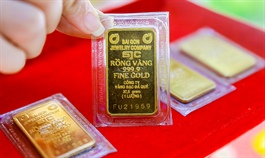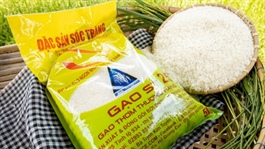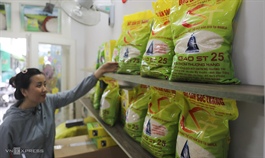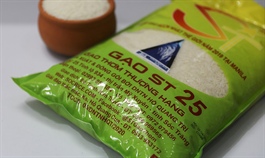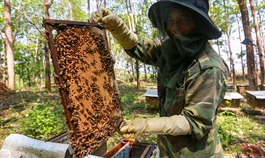Trademark trickery blurs rice status
Trademark trickery blurs rice status
Unlike regional competition, Vietnamese branding approaches of well-established rice varieties could still see some improvements because of existing ambiguities in the product development strategies of the responsible government agenies. Nevertheless, the renowned ST25 rice could still participate in next year’s World Rice competition, and thus secure fame for one of the most important export goods of the nation.
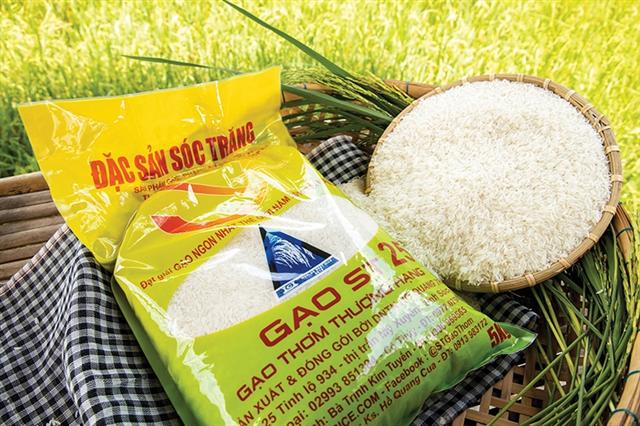
ST25 was voted World’s Best Rice at the award ceremony of the same name in 2019, Photo: Le Toan
|
It is currently not possible to determine whether the United States Patent and Trademark Office (USPTO) will approve which company as the rightful owner of the ST24 and ST25 rice trademark in the US. On its trademark registration system, the USPTO on April 22 stated that five dossiers for the registration of trademark protection of ST25 rice are currently being examined, which means that the applying businesses have at least met the minimum requirements for filing a trademark application, though the USPTO has not gone through the review process yet.
The fact that four US companies registered trademarks for the ST24 and ST25 rice variants before the private company Ho Quang Tri Company, the legal owner of the ST25 rice variety, raised the latter’s fears of losing the trademark to an American business.
If a US company’s trademark registration is approved by the USPTO, every time a Vietnamese business exports this type of rice to the US market, it would need to pass the trademark owner there. Should Vietnamese companies then not follow this procedure when exporting ST24 and ST25 rice to the US, they will be accused of violating US intellectual property rights.
Contrary to the feelings of many other stakeholders, Ho Quang Tri Company stated that it is not too worried as rice is a non-exclusive product. The company also believes that the fact that US businesses register trademarks for ST25 rice does not affect the ownership of the rice variety. Instead, these businesses could even be the importers of Vietnamese counterparts.
No exclusivity required
The ST25 rice variety was granted a protection certificate last March by the Department of Crop Production under Vietnam’s Ministry of Agriculture and Rural Development (MARD). The holder of the certificate is Ho Quang Tri Company, with the creators of this rice variety named as Ho Quang Cua, Tran Tan Phuong, and Nguyen Thi Thu Huong.
“An individual or organisation cannot register for exclusive protection of ST25 rice in the US or other countries, so there is no loss of trademark,” said Nguyen Van Bay, deputy director of the Intellectual Property Office under the Ministry of Science and Technology last week.
In Vietnam, as ST25 is the general name of a plant variety, here rice, it cannot be registered as a trademark under the provisions of the Trademark Appraisal Regulation.
Dinh Thi Hoang Nhung, CEO of HNLaw & Partners, told VIR that domestic businesses can still register their trademarks as these will be associated with the name of that business. However, the protected content of later registration must be different from that of previous ones.
Vietnam has been a signee of the Madrid Agreement Concerning the International Registration of Marks administered by the World Intellectual Property Organization with more than 50 member countries. Procedures for trademark registration abroad are carried out in accordance with relevant international treaties to which Vietnam is a signatory. Lawyer Nhung believes that this is a good condition for Vietnamese enterprises to promote their export activities and improve production value.
Kieu Anh Vu, executive lawyer at KAV Lawyers, explained that if Ho Quang Tri Company wants to protect its interests on a global scale, it needs to register its claims according to the regulations of those countries or international agreements. “This will likely be expensive, but businesses should consider implementing it to protect their brand as intellectual property rights are territorial,” Vu warned.
Unclear strategies
ST25 rice has become renowned for its value and quality and has earned a significant trust from customers around the world through several competitions. More than 20 years ago, Ho Quang Cua and his colleagues tried their best to find genetic resources to breed new rice varieties that are “delicious and aromatic”. The now existing variety is the result of research with another rice variety, the fragrant Tam Hai Hau rice, which was examined during a project funded by the International Atomic Energy Agency.
It was not until last year that Vietnam’s ST25 rice was mentioned among the world’s best rice varieties, which was a result of analyses and testing after each harvest, as well as domestic and global examinations.
The distinctive factor for ST25 rice that made it surpass Thai Hom Mali rice to become the top rice in the world was that the Thai rice variant only has the fragrance of pineapple leaves.
Meanwhile, ST25 rice has both the aroma of pineapple leaves and of com, the immature rice kernels roasted over low heat which are then pounded in a mortar and pestle until flattened and typically enjoyed with bananas.
Industry analysts at The Rice Trader every March announce new contests. Cua said he would still participate with the ST24 and ST25 rice variants to confirm the position and brand of Vietnamese rice, based on domestic examination results and with consensus of the Vietnam Food Association.
Even if a fragrant rice variety wins an international prize, if it lacks growth potential, the product cannot generate sales in the market – a fact that Hoang Trong Thuy, an independent analyst of agricultural affairs, pointed out, adding that, “Currently, Vietnam has very few protected agricultural brands.”
Thuy, who has more than 40 years of research experience on Vietnamese agriculture, said that the Ministy of Industry and Trade and the MARD are responsible for supporting companies like Ho Quang Tri to develop a national brand for their products. “We could for instance learn from the Thai competition on how to develop Thai Hom Mali rice brand into a national brand,” Thuy suggested.



